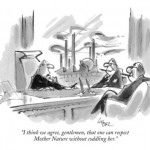2.1 Main Points from A Conversation with Carolyn Merchant Reading 
“I believe that the partnership ethic …is not the death of nature and not mechanistic science but one of sustainable partnership with nature and … is part of the social reconstruction that is required.” (Merchant, 2002)
a. Women’s Identification with Nature
Prior to the scientific revolution, nature was viewed as female; a living organism, including stones and metals, with a body, soul and spirit. She either was fertile and rewarded through abundance or punished by withholding her favours.
b. Mechanistic Worldview = Ecological Crisis
Prior to the scientific revolution heralded a mechanistic view of nature; matter was posited as dead, spiritless particles to be manipulated by an external force — humans, as he wished — without retaliation. This mechanistic view became the dominant ideology of capitalism that led to the pillaging of nature and our ecological crisis.Global ecological crisis resulted from a combination of complex factors including population pressures, global warming, ozone depletion, industrial pollution and toxic build up, and threats to wilderness habitats.
c. Narratives: Progressive, Recovery, Ethic Partnerships
Many narratives have dominated post the scientific revolution of the 17th century. The progressive narrative argued that because technology can be used to control nature, it, along with science and capitalism, can be utilized to remake earth. This transitioned into the recovery or enlightenment narrative that humanity can recover the Garden of Eden through progressive technology. The combination seemed successful with such positive outcomes for the middle to upper class but increased poverty for the lower class.
The women’s movement of the 20th century forced us to confront and critique our narratives and realize our Fall from Eden. The recovery narrative reflected the conservative narrative or points of view about for sustained preservation and rapid replacing. Both views of the recovery narrative continues today: progressive recovery and conservationist recovery.
However, what is needed is a new ethic, a new narrative that “preserves humanity and also preserves the environment.” This is the partnership ethic in which man and woman partner with each other and nature towards a social reconstruction. Required is a sustained partnership that would combine science and technology as organic agriculture, new ideas of ecology, and sustainable development advocates, activities and agreements.
Please note: The full article or reading can be found here A Conversation with Carolyn Merchant.
Check out Carolyn Merchant graduate council lecture on Environmentalism: From the Control of Nature to Partnership here https://www.youtube.com/watch?v=_rWKq8vrcGw
After you have read the article and watched the youtube video, please post your response to Focus Question 1 in the discussion forum.
Focus Question 2: Where should we situate educational technology in the partnership ethic and social reconstruction narrative as described by Carolyn Merchant?
2.2 About Carolyn Merchant
Carolyn Merchant is one of today’s leading environmental historians and writers. Her research looks at the interrelationship of these three topics: American environmental and cultural history in the overall context of Western history, philosophy, and the history of science. Notable books include The Death of Nature: Women, Ecology, and the Scientific Revolution, and Columbia Guide to American Environmental History. She is a professor of environmental history, philosophy and ethics at the University of California, Berkley, where she has taught for more than twenty years. She is also the current president of the American Society for Environmental History.
To learn more about Carolyn Merchant, visit her web page.
Reference
Merchant, C. (2002). A conversation with Carolyn Merchant. California Monthly, 112(6).

Thanks for all this information. Very helpful for those of us teaching her work.